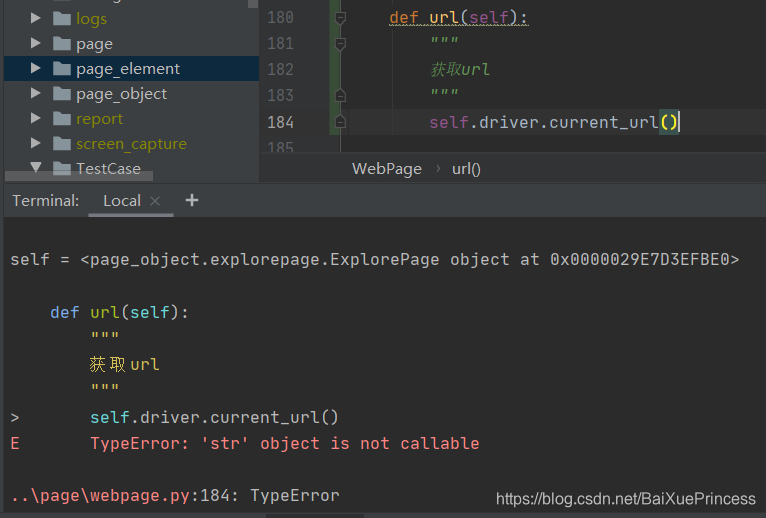最近在学习自动化测试,使用的是selenium+pytest自动化测试框架,对selenium api封装,运行时报了
TypeError 'str' object is not callable

‘str’ object is not callable 一般出现在企图调用一个不可被调用的对象。
其实 pycharm 已经将有问题的代码做了下划线标注啦。
通过阅读selenium api文档发现,一些属性(或者方法)是可以调用的,另外一些不可以调用,可以调用的属性是以圆括号结尾的。
下面是属性的一个例子: * current_url 当前载入页面的URL
使用:
driver.current_url
下面是方法的一个例子 * close()
关闭当前窗口 使用:
driver.close()
所以要认真阅读文档才能避免一些不必要的错误 。
但是要想
driver.current_url
能被调用怎么办呢,经常我不懈的努力,终于找到了一个非常好的解决方法,那就是@property !
@property是Python内置的装饰器。它的作用是:将方法变成属性调用。
使用场景:
1.修饰方法,使方法可以像属性一样访问。
class DataSet(object):
@property
def method_with_property(self): ##含有@property
return 25
def method_without_property(self): ##不含@property
return 25
l = DataSet()
print(l.method_with_property) # 加了@property后,可以用调用属性的形式来调用方法,后面不需要加()。
print(l.method_without_property()) #没有加@property , 必须使用正常的调用方法的形式,即在后面加()
2.与所定义的属性配合使用,这样可以防止属性被修改。
由于python进行属性的定义时,没办法设置私有属性,因此要通过@property的方法来进行设置。这样可以隐藏属性名,让用户进行使用的时候无法随意修改。
class Rectangle(object):
@property
def width(self):
# 变量名不与方法名重复,改为_width,下同
return self._width
@width.setter
def width(self, value):
self._width = value
@property
def height(self):
return self._height
@height.setter
#与property定义的方法名要一致
def height(self, value):
self._height = value
@property
def resolution(self):
return self._width * self._height
s = Rectangle()
s.width = 1024
s.height = 768
print('resolution =', s.resolution)
if s.resolution == 786432:
print('测试通过!')
else:
print('测试失败!')